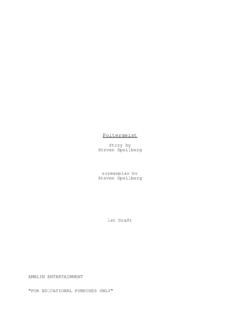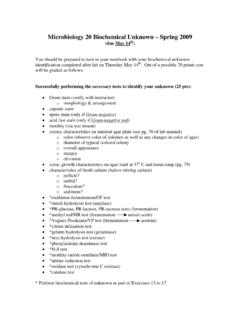Transcription of Steven L. Paul - Klein Hornig
1 THE LOW-INCOME HOUSING TAX CREDIT Steven L. paul Boston . Washington . Klein Hornig LLP provides tax and syndication expertise to developers and syndicators of, and investors in, affordable housing projects utilizing the low-income housing tax credit. Services offered by the Firm include tax and structuring advice, preparation of offering materials, partnership agreements and other syndication documents, rendering of tax opinions and, when appropriate, obtaining IRS private letter rulings. The Firm regularly works on projects sponsored by nonprofit organizations. Our experience includes projects for families, mixed-income projects, including large-scale 80-20 projects, projects for the elderly, including congregate care and assisted-living facilities, single-room occupancy projects for homeless individuals or individuals with substance abuse problems, projects for tenants with special needs, HOPE VI projects, mixed-use projects and projects eligible for both the low-income housing and rehabilitation tax credits.
2 Steven paul joined the Firm as a partner in March of this year. Before joining the firm, Steve was a partner and, for many years, served as the Chair of the Tax, Benefits and Compensation Department of Boston s Palmer & Dodge LLP and its successors, Edwards Angell Palmer & Dodge LLP, Edwards Wildman Palmer LLP and Locke Lord LLP. He is a former Chair of the Committee on Real Estate of the American Bar Association Section of Taxation. Mr. paul has twice been appointed Visiting Lecturer in real estate taxation and finance at Yale Law School, where his course featured low-income housing syndications. He has also taught at the Boston University Law School Graduate Tax Program and served as Chair of the Federal Tax Committee of the Boston Bar Association and vice-chair of the Tax Section of the Massachusetts Bar Association. He served as Attorney-Advisor and Assistant Branch Chief in the Interpretative Division, Office of Chief Counsel, Internal Revenue Service.
3 Mr. paul received his from the University of Pennsylvania in 1970, his from Boston College Law School in 1973, and his in Taxation from Georgetown University Law Center in 1976. The assistance of Katie G. Day and Emily J. Blumberg in the updating of this outline is gratefully acknowledged. Katie joined Klein Hornig in 2015, focusing her practice on federal and state income taxation of corporate, flow-through, and tax-exempt entities, as well as individuals. Katie represents developers, syndicators and investors in federal and state tax credit transactions, including historic, new markets and low-income housing tax credits. Katie also has extensive experience representing non-profit organizations and is well-versed in the law of tax-exempt organizations, including the rules governing private foundations, various federal and state reporting requirements, and the tax on unrelated business income. Prior to joining Klein Hornig , Katie worked for Edwards Wildman as a member of the firm s Tax, Benefits & Compensation Department.
4 Katie received her from The College of William & Mary in 2003, her from Boston College Law School in 2006 and her in Taxation at Boston University in 2014. Emily Blumberg focuses her practice on a wide range of affordable housing and community development issues, including public housing/mixed-finance development, Low-Income Housing Tax Credits, HUD regulatory matters, and nonprofit organizations. She draws on her recent experience as a Polikoff-Gautreaux Fellow at Business and Professional People for the Public Interest (BPI) in Chicago, where she used legal, policy, and legislative advocacy to revitalize public housing and preserve affordable housing. Prior to joining BPI, Emily clerked for Justice Denise R. Johnson of the Vermont Supreme Court. Emily received her from Harvard College in 2004 and her from Harvard Law School in 2010. August 18, 2015 HIGHLIGHTS OF 2015 EDITION On September 18, 2014, the Internal Revenue Service (IRS) released its updated Audit Technique Guide (ATG) for the Low-Income Housing Tax Credit (LIHTC) Program.
5 The ATG was last updated in 1999. The revised ATG includes a number of additions and revisions. In Appendix C of the updated ATG, the IRS takes the position that relocation costs attributable to moving a qualified low-income household and providing temporary housing for the household during rehabilitation are expensed as ordinary and necessary business expenses under Code Section 162 and thus are not included in Eligible Basis. Appendix C, Audit Technique Guide for IRC Section 42, updated September 2014. There has also been continued controversy regarding nonprofit set-asides. The updated ATG confirms that tax credits allocated from the non-profit set-aside may be subject to recapture if ownership or material participation of the nonprofit organization terminates during the Compliance Period and provides guidelines in defining material participation. Ch. 6, Audit Technique Guide for IRC Section 42, updated September 2014; see also CCA 201352009 (December 27, 2013).
6 The ABA Forum on Affordable Housing and Community Development, in a letter to the IRS dated March 27, 2014, expressed concern that the approach adopted in the CCA and the updated ATG, which it believes is inconsistent with the statutory language, could have a negative effect on projects involving nonprofit organizations. In Program Manager Technical Advice 2014-22, the IRS clarified that charging rent, utilities or both to a resident manager or maintenance personnel does not cause the unit to be treated as a residential rental unit (it remains a facility reasonably required for the project) and that the general-public-use requirement does not apply to units for resident managers or maintenance personnel because such units are facilities reasonably required for the project, not residential rental units. Program Manager Technical Advice 2014-22, CCA POSTN-111812-14 (June 2, 2014). As the LIHTC program matures and projects reach year 15, increased attention is paid to various re-syndication and exit issues, including over-income tenants, sales between related parties and prior placements in service by related parties.
7 The MSSP Training Guide, Guide for Completing Form 8823 sets forth the treatment of low-income units occupied by over-income tenants and the temporary relocation of over-income tenants in a mixed-income project in the context of an acquisition/rehabilitation and re-syndication of an existing low-income housing tax credit project. This edition of the outline includes several illustrative examples of these issues. While major tax reform is unlikely until after the next Presidential election, tax extender legislation, probably for 2015 and 2016, may extend the temporary minimum credit rate and certain other provisions relevant to the low-income housing tax credit. In July 2015, the Senate Committee on Finance voted to approve a package of tax extenders including such provisions. TABLE OF CONTENTS Page i. I. TIMING AND AMOUNT OF CREDIT .. 1 A. Ten Year Period.. 1 B. Amount of Credit.. 3 C. Determination of Applicable Percentage.. 7 D.
8 Compliance Period.. 11 II. ELIGIBLE BASIS/QUALIFIED BASIS .. 12 A. New Buildings and Substantial Rehabilitations.. 12 B. Existing Buildings.. 13 C. Special Rules for Calculating Eligible Basis.. 18 D. Property Purchased During Construction.. 25 III. DEFINITION OF QUALIFIED LOW-INCOME BUILDING .. 25 A. Must be subject to the Modified Accelerated Cost Recovery System.. 25 B. Must be part of Qualified Low-Income Housing Project .. 25 C. Multiple Buildings.. 36 D. Definition of Low-Income Units.. 38 E. Extended Use Requirements.. 42 IV. ALLOCATION OF CREDIT .. 47 A. Allocation Required.. 48 B. Timing and Duration of 48 C. Determination of State Ceilings.. 51 D. Allocation Procedures: Qualified Allocation Plans.. 53 E. Compliance Monitoring.. 55 F. Set-Aside for Non-profit 57 G. Special Rules.. 63 H. Bond Financed Projects.. 63 I. Correction of Administrative Errors.. 67 V. RECAPTURE OF 69 A. Recapture Events During Compliance Period.
9 69 B. Amount Subject to Recapture.. 73 C. Large Partnerships.. 73 TABLE OF CONTENTS (continued) Page ii. VI. LIMITATIONS ON CREDIT .. 74 A. Regular Section 38 Rules Apply.. 74 B. Section 183 and Similar Limitations Do Not Apply.. 74 C. Application of At Risk Rules.. 75 D. Application of Passive Activity Rules.. 76 VII. MASSACHUSETTS LOW-INCOME HOUSING TAX CREDIT .. 76 A. Timing and Amount of 76 B. Allocation of Credit.. 77 C. Recapture of Credit.. 79 VIII. COLLATERAL TAX ISSUES .. 80 A. Partnership Allocations.. 80 B. Deferred Development Fees.. 81 C. Partnership Anti-Abuse 82 D. Economic Substance.. 82 E. Federal Tax Treatment of State Tax Credits.. 84 F. Imputed Interest.. 87 G. Property Taxes and Related Issues.. 88 H. Tax-Exempt-Use Property.. 89 I. Reportable Transactions: Disclosure Requirements and Excise Taxes.. 90 J. Electronic Filing and Form 8609.. 91 K. Hurricane and Other Disaster-Related Relief.. 91 L. Form 8823, Low-Income Housing Credit Agencies Report of Noncompliance or Building Disposition, and Updated 42 Audit Technique Guide.
10 94 M. Legislative Updates.. 97 I. TIMING AND AMOUNT OF CREDIT A. Ten Year Period. The low-income housing tax credit is claimed annually over a ten-year period (the Credit Period ) which begins when a building is placed in service or, at the irrevocable election of the taxpayer, in the succeeding taxable year. Internal Revenue Code of 1986, as amended ( Code ) 42(a) and (f)(1). Buildings in the same project may have different Credit Periods. 1. The first-year credit is reduced to reflect the number of months of qualified occupancy (determined as of the last day of each month) during the first year. Note that although first-year occupancy is determined at the end of each month, a unit must be in service for the full month to qualify for credits. Code 42(f)(2)(A)(i); Rev. Rul. 2004-82, 2004-2 350. 2. Any unused portion of first-year credit is allowed in the 11th year. Code 42(f)(2)(B). 3. Credit Period for costs of acquiring existing building generally does not begin until the building has been substantially rehabilitated.






